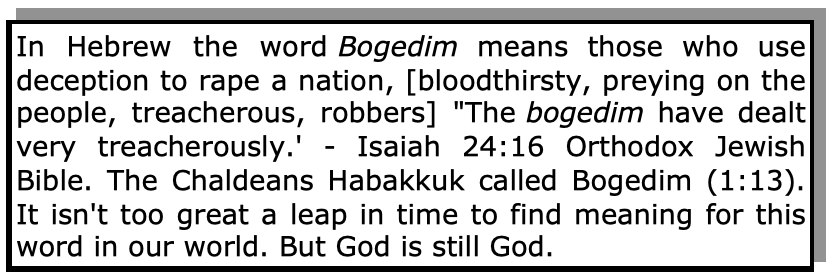The arrogance of the Babylonians was unnerving [Habakkuk 1:10-11] The Babylonians  attribute their military successes to their own strength as their god. Habakkuk, notwithstanding, is confident and hopeful that God will not permit His people to perish at their hands. The prophet’s argument is that a Babylonian exile is an instrument of God’s judgment and it is not Babylon’s strength that brings victory.
attribute their military successes to their own strength as their god. Habakkuk, notwithstanding, is confident and hopeful that God will not permit His people to perish at their hands. The prophet’s argument is that a Babylonian exile is an instrument of God’s judgment and it is not Babylon’s strength that brings victory.
“…we do not wrestle against flesh and blood, but against principalities, against powers, against the rulers of the darkness of this age, against spiritual hosts of wickedness in the heavenly places.” Paul reminds us [Ephesians 6:12].

Written of Mary while Jesus was dying – written by Jeremiah A. Denton, Easter 1969, while in a Vietnam prison.
“Man proposes but God disposes,” the saying goes. [Ezekiel 26:3; Proverbs 16:9; Isaiah 10:5-6; Jeremiah 10:23]. Habakkuk prayed,
“Are You not from everlasting, O LORD my God, my Holy One? We shall not die. O LORD, You have appointed them for judgment; O Rock, You have marked them for correction” [1:12].
“We will not die!“
Habakkuk’s hope (and ours) rests on 2 truths:
- Jehovah is my God, Israel’s God [Song of Solomon 6:3] not because we chose Him but because He chose us. [Psalm 65:4; John 15:16]. John Calvin astutely taught, “Therefore, whoever desires to fight bravely … let him first settle the matter with God himself, and, as it were, confirm and ratify the treaty which God has set before us, namely, that we are his people, and He will be a God to us in return.”1 The god of the Babylonians is not God! Jehovah is my God! My God is always victorious in battle!
- God is Holy. “The absolutely Pure One who cannot look upon evil.”2 God, because He is Holy, He will mercifully honor His commitment in covenant to judge or punish evil. Jehovah’s name means “the absolutely constant One, who is always the same in word and work3“…from everlasting…” Correction or chastisement might be indeed painful but God administers this unto His own children [Deuteronomy 8:5; Hebrews 12:6]. When David, probably because his faith was weak—unexpectedly and without cause—was in need of serious correction, he pleaded with the prophet, “Please let us fall into the hand of the LORD, for His mercies are great; but do not let me fall into the hand of man” [2 Samuel 24:10-14].
When Habakkuk maintains, “we will not die.” he was not pleading with God to spare them, but affirming his faith that God chastises those He has chosen and whom He loves. And chastisement does not kill, it revives and brings us closer to our God.
The Rock of Ages
He is a Rock, “an unchangeable refuge of His people’s trust.”4 In Deuteronomy 32 Moses employed this sobriquet, “a Rock,” 4 times5.
“Rock of Ages cleft for me, let me hide myself in Thee.” What profound truth is sung and celebrated here! What an empowerment to faith! What a confirmation of Who God is! If we cannot find the words to pray when, like Habakkuk, we find ourselves in crisis, sing this song! It will speak for you.
Rock of Ages, cleft for me,
let me hide myself in thee;
let the water and the blood,
from thy wounded side which flowed,
be of sin the double cure;
save from wrath and make me pure.
Not the labors of my hands
can fulfill thy law’s demands;
could my zeal no respite know,
could my tears forever flow,
all for sin could not atone;
thou must save, and thou alone.
Nothing in my hand I bring,
simply to the cross I cling;
naked, come to thee for dress;
helpless, look to thee for grace;
foul, I to the fountain fly;
wash me, Savior, or I die.
While I draw this fleeting breath,
when mine eyes shall close in death,
when I soar to worlds unknown,
see thee on thy judgment throne,
Rock of Ages, cleft for me,
let me hide myself in thee.
[United Methodist Hymnal, 1989]
2 Ibid. Page 64
3 Genesis 2;4 calls God’s creation, in NKJV, a ‘history’ because on this week science was set in motion for man later to discover.
4 Ibid.
5 Deuteronomy 32:4, 15, 18, and 37 Verse 4 put to music is an old chorus.

